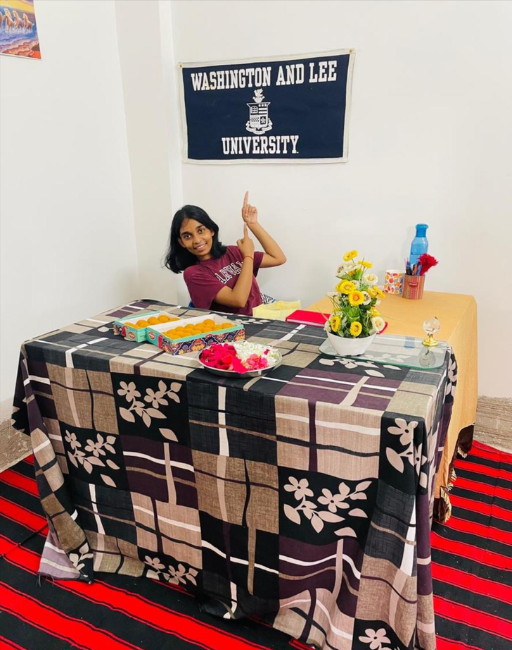W&L Student Empowers Her Community through Davis Projects for Peace
Funded Projects, Partner Institutions, Asia, Equipment & Infrastructure, Health & Well-being, Livelihoods

The Davis Projects for Peace grant brings global recognition to the fact that women’s dignity and autonomy are essential to peace.
This article was originally published by Washington and Lee University.
This summer, Washington and Lee student Anshika Patel ’26, a mathematics major with minors in data science and education policy, is back in her hometown of Jaunpur, Uttar Pradesh, India, to continue building a movement. As a 2025 Davis Projects for Peace grant recipient, Patel set out to scale up her initiative, Wings of Women (WoW), a community-driven project aimed at empowering women through sustainable menstrual health solutions and vocational training.
Davis Projects for Peace is a global program that partners with educational institutions to identify and support young peacebuilders. Each year, the program grants $1.25 million to student leaders who are developing innovative, community-centered and scalable responses to the world’s most pressing issues. This year’s cohort is made up of 134 projects nominated by 94 partner institutions, and the projects will take place in 62 countries and 16 U.S. states. Washington and Lee University is eligible to receive Davis Projects for Peace grants as a partner school of the Davis United World College Scholars Program. The program is funded by the late Kathryn Wasserman Davis, who established it on her 100th birthday in 2007 as a way to challenge young people to plant seeds of peace throughout the world with innovative projects, and at least one Washington and Lee student has won a Davis grant each year since the award’s inception.
Dallas Tatman, assistant director of fellowships and visiting instructor of anthropology, works with potential Davis applicants through the Office of Fellowships and is focused on growing the program’s reach while keeping its mission centered.
“The biggest part of the Davis Projects for Peace is the peace component,” he says. “Students have to individually define what peace is in this particular context.” Tatman encourages students interested in applying for the Davis Projects for Peace grant to make an appointment with him during the Fall Term to begin working on their applications.
Patel saw the grant as an opportunity to define and advocate for peace in her community’s specific needs.
“For some people, peace means being free from persecution due to one’s nationality, race, political affiliation, religious beliefs, sexual preference or many more,” she explains. “Peace has a different definition for women in my community. It’s having the courage to talk openly about menstruation, access to gynecologists and menstrual pads, financial independence and protection against domestic violence. The Davis Projects for Peace grant brings global recognition to the fact that women’s dignity and autonomy are essential to peace.”
WoW offers free training in sewing reusable menstrual pads as well as mending and altering traditional garments, while also educating women and girls on reproductive health, still considered a taboo subject in many parts of rural India. The initiative operates out of a dedicated space built onto Patel’s family home, and it now employs local women as trainers and ambassadors for the program. Menstrual health education is discreetly woven into the process of training young women in the community in sewing.
“You can’t just call girls to talk about pads — they won’t come,” Patel explains. “But when they come to learn stitching, we can then create a safe space to talk openly.”
This year’s work builds on a previous version of the project Patel launched in 2024 with grant support from W&L’s Center for International Education. This summer’s expansion of WoW trained new women for a second location and, Patel notes, revealed progress in community attitudes.
“Unlike last year, we didn’t have a problem convincing people to come to the center,” she says. “People are more open to the conversation about menstrual hygiene.”
She says her long-term vision is to expand WoW into neighboring communities and create partnerships with local schools for health education programming. Patel, who is headed to Oxford, England, this fall for a semester abroad, is confident that WoW will continue to build momentum in the hands of its capable volunteers.
“Even a small change in my community could create a huge impact — if a girl can carry a pad without hiding it, that’s a milestone,” Patel says. “It gives me hope that grassroots ideas like WoW can bring systemic change, one village at a time.”

